President Trump Didn’t Recognize a Classic Reporter Softball Question
It’s not often when reporters acknowledge the hidden motive behind many of their questions.
That’s what happened in a high-profile exchange during a White House press briefing after President Trump attacked NBC’s Peter Alexander for asking a negative question.
Media trainer Russ Rhea with the Predictive Media Network explains why reporters ask Proxy questions, one of the six question types in the Predictive Interviewing Model.
TRANSCRIPT
Hi, I’m Russ Rhea. I try to avoid politics in these videos. Although, this example I’m about to show you did happen during a presidential press conference. It shined a light on a common reporter tactic in an interview. Which may be perceived as a negative question, but is actually a great opportunity to deliver an important message. You may recall this exchange between President Trump and a NBC correspondent, Peter Alexander, during a white house coronavirus taskforce briefing.
NBC’s Peter Alexander:
Let me say the Americans were scared though. I guess nearly 200 dead, 14,000 who are sick, millions, as you witnessed, who are scared right now. What do you say to Americans who are watching you right now, who are scared?
President Trump:
I, I say that you’re a terrible reporter. That’s what I say. I think it’s a very nasty question. And I think it’s a very bad signal that you’re putting out to the American people.
Russ Rhea:
Although the president criticized him for asking a negative question, Alexander, later acknowledged what he was actually doing.
NBC’s Peter Alexander:
In TV terms, we call this a Softball. I was trying to provide the president an opportunity to reassure the millions of Americans, members of my own family and my neighbors and my community and plenty of people sitting at home right now. This was his opportunity to do that. To provide a sort of positive or uplifting, uplifting message.
Russ Rhea:
That’s right. A softball. You can actually look at questions like this that might feel like it puts you on the defensive as an opportunity. We call this a proxy or representative question in our predictive interviewing model, which is based on a research of thousands of media interviews.
Reporters are trained to ask these questions. But it’s really an open ended question where you can respond with a positive message, you really want the audience to know. Instead of getting defensive, make a strong point. Like actor, Tim Robbins, did here with a proxy question about a theater program in prisons.
Reporter:
When critics say, “Public resources are scarce, why should my tax dollars go to something like this?” What do you say?
Tim Robbins:
The relatively low investment in arts programs creates so much benefit for society.
Russ Rhea:
When you’re asked a question along the lines of “What would you say to people about, whatever?” Remember, it’s a softball. And you can say just about whatever you want the audience to hear. Thanks for watching.

